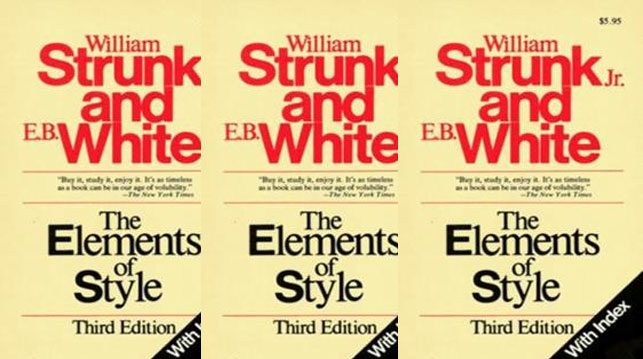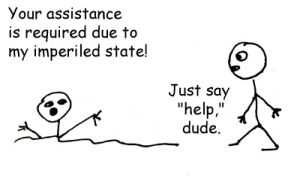
Most people are quick to go to sites like Grammar Girl or The Oatmeal when they have questions about writing. These sites are ideal for looking up whether you want to know if it’s whiskey or whisky or what a dangling modifier is. They provide sound information on how to write correctly.
But when it comes to writing well, you’d be hard-pressed to find better advice than that contained in William Strunk, Jr. and E.B. White’s The Elements of Style. First published in 1935, this slim volume provides wise guidance still relevant in today’s world of instant communication.
The book has its critics, and even the more-recent fourth edition contains some old-fashioned chestnuts that might make you chuckle, like “a word processor can save you time and labor as you rearrange your manuscript.” Nevertheless, all who write and are looking to improve their craft should keep a copy close by. Here are some of their ideas that will never go out of fashion.
Get a free sample proofread and edit for your document.
Two professional proofreaders will proofread and edit your document.
Communication above All Else
Strunk and White take this seriously. They state that writers should seek to communicate what they have to say in the fewest words possible. The writer should do all the work to make things easy for the reader.
 White writes in the introduction for the 1979 edition, “Will [Strunk] felt that the reader was in serious trouble most of the time, floundering in a swamp, and that it was the duty of anyone attempting to write in English to drain this swamp quickly and get the reader on dry ground.”
White writes in the introduction for the 1979 edition, “Will [Strunk] felt that the reader was in serious trouble most of the time, floundering in a swamp, and that it was the duty of anyone attempting to write in English to drain this swamp quickly and get the reader on dry ground.”
This value of communication is evident throughout The Elements of Style. Strunk and White support writing in a way that comes naturally, using “words and phrases that come readily to hand.” Using this kind of plain language bridges the gap between writer and reader. They discuss the importance of not overwriting or overstating because ornate prose and outlandish claims alienate the reader. The writer’s job is to inform and entertain.
Clarity, Clarity, Clarity
Without clarity, Strunk and White say, you have nothing, “although there is no substitute for merit in writing, clarity comes close to being one.”
This is a typical mistake of novice writers. In an effort to be unique and impressive, young writers often seek to obscure their meaning and send the reader on a quest to find the point. After all, that’s how (they think) authors like Joyce and Faulkner became literary greats.
But The Elements of Style mostly rejects these techniques and insists they should never interfere with clarity: “Even to a writer who is being intentionally obscure or wild of tongue we can say, ‘Be obscure clearly! Be wild of tongue in a way we understand!’”
They so oppose what they refer to as “muddiness” that they blame it for a variety of tragedies; it is “death on a highway caused by a badly worded sign, heartbreak among lovers caused by a misplaced phrase in a well-intentioned letter.”
Avoid Pretentious Style
A classic mistake is thinking that fancy words will improve a piece of writing. Teachers spot immediately the student who right-clicks every other word and selects the longest synonym available. It doesn’t make the writing sound smarter. In fact, it often has the opposite effect.
Their caution against pretentiousness is not a blanket statement against multisyllabic words. Sometimes a big word is need, and the authors note the difference “between the fancy and the plain, between the atrocious and the felicitous, is sometimes alarmingly fine.”
As is often the case with writing, there’s no easy fix. The only real solution is to develop one’s ear through years of reading and rereading excellent prose. When you use long words, be sure that you have a solid reason to do so. Sometimes there’s no shorter word that expresses your meaning, or the longer word makes the sentence flow better.
Edit Viciously
Once you have completed a first draft, Strunk and White say it is time to experiment and look for how to improve the communication. One good way to start is by omitting needless words. At ProofreadingPal (people to go to when you want an objective eye on your work), we often see “to be able to” and “in order to.” For both, “to” is almost always better.
A more difficult target is eliminating general and abstract language. Your sentences may be grammatically correct and concise, but still not communicate anything substantive.
Strunk and White provide this delightful example in contrasts: “He showed satisfaction as he took possession of his well-earned reward.” Compare that mess with this: “He grinned as he pocketed the coin.” Wherever you can, replace the general with the specific and the abstract with the concrete to make your writing livelier.
The Elements of Style remains a classic guide for all writers. In an age where people feel comfortable espousing their opinions about any topic, its humble, no-nonsense, reader-centered approach to writing is refreshing.
Chris R.
Get a free sample proofread and edit for your document.
Two professional proofreaders will proofread and edit your document.
Get a free sample proofread and edit for your document.
Two professional proofreaders will proofread and edit your document.
We will get your free sample back in three to six hours!